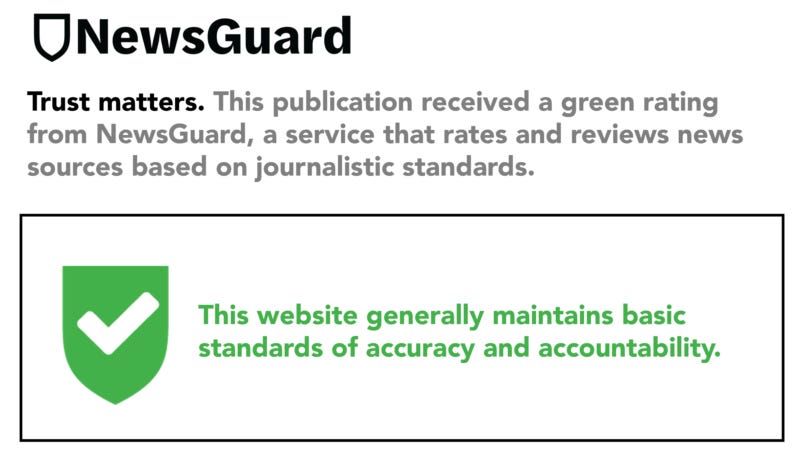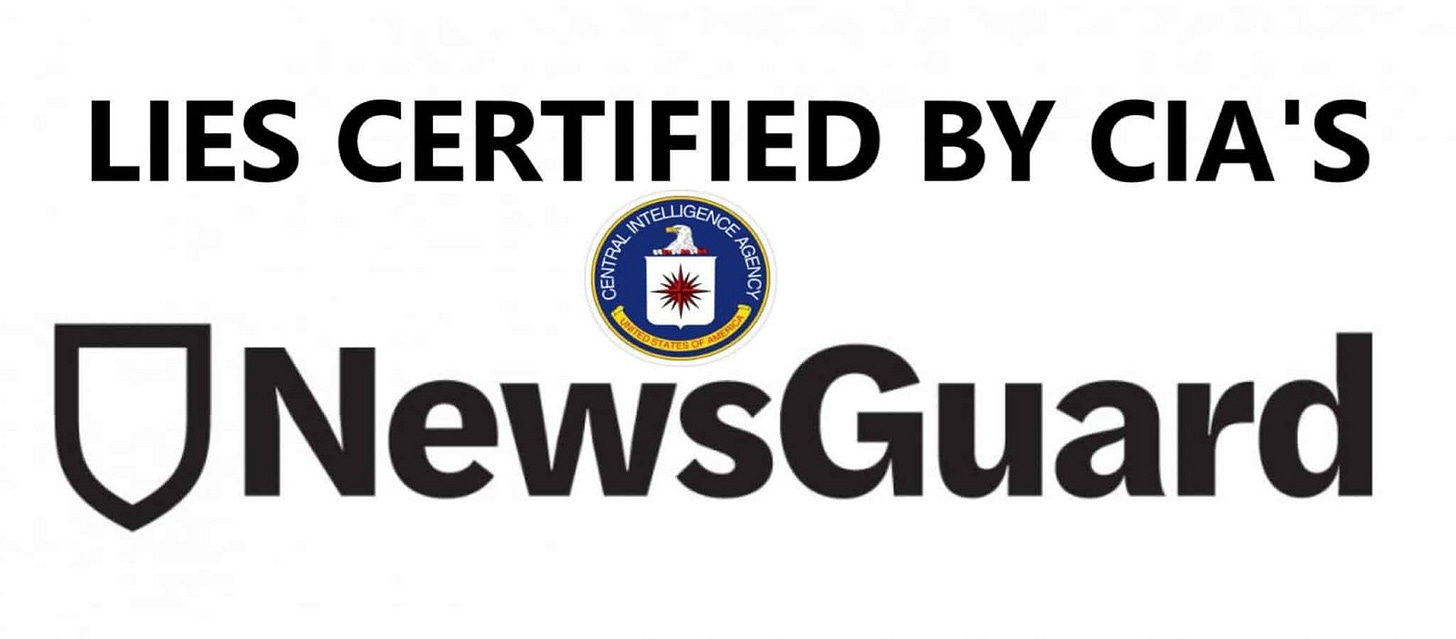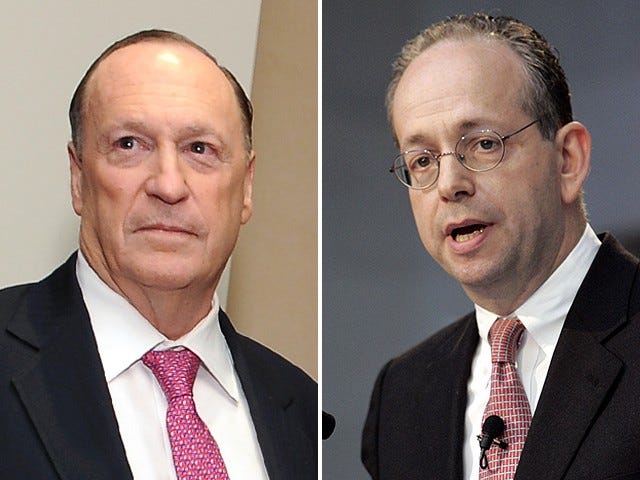NewsGuard: Trust Scores from the Liars’ Club
How a spooky corporate clique decides for the plebs what's worth reading
Maybe you’ve heard of the pox on modern journalism known as NewsGuard. It’s a web browser extension that fancies itself the “global leader in information reliability,” which is quite the boast in an age of rampant mistrust towards government and establishment institutions.
NewsGuard was cooked up by co-founders Steven Brill and Gordon Crovitz, who are pedigreed up to their eyeballs with deep ties to corporate media, the State Department, the Pentagon, and are generally defenders of the old-guard power structure.
It makes sense that they’ve become stalwart defenders of the political establishment, as these men hail from the same smarmy elitist class who belong to the neoliberal/neoconservative uniparty orthodoxy, and couldn’t be further detached from the common folk in this country, whether its the populist left or the populist right or the myriad individuals in the middle who have just tuned out altogether.
Both men have traveled the traditional paths to power: Brill’s a Yale Law grad who’s spent decades cozying up to the elite, while Crovitz ran the Wall Street Journal’s publisher arm—yeah, these are the guys deciding what’s “credible” for you plebs. Add to that an advisory board stacked with ex-CIA spooks like Michael Hayden (member of CFR, LIGNET, Atlantic Council) and former DHS honcho Tom Ridge, and you’ve got a recipe for a surveillance-state wet dream masquerading as a public service.
NewsGuard’s gig is simple but sinister: they slap little green checkmarks or red warning labels on news sites, supposedly to protect us from “misinformation.” But take a small peek behind the curtain, and it starts to look like a control racket.

They’ve got this opaque rating system—nine criteria they claim are objective, like “does not repeatedly publish false content” or “handles the difference between news and opinion responsibly.” Sounds noble, right? Except they’re the ones defining “false” and “responsible,” and their track record of bias and isn’t great.
So, what have they gotten wrong? Well for starters, and quite unsurprisingly, they blemished their credibility by prematurely dismissing the Hunter Biden laptop as “a hoax.”
Back in 2020, when the New York Post dropped its bombshell story about Hunter Biden’s laptop, NewsGuard was quick to cast doubt. Co-CEO Steven Brill even called it a “hoax” in interviews, aligning with the establishment chorus dismissing it as Russian disinformation. Fast forward to 2022, when outlets like The New York Times confirmed the laptop’s authenticity—oops. NewsGuard had to eat crow, but here’s the kicker: while they eventually downgraded The Daily Beast (from 87.5/100 to 57/100) for its own flubs on the story, big players like Axios, BuzzFeed News, USA Today, and The Washington Post kept their perfect 100/100 scores despite peddling the same skepticism.
Early on, NewsGuard leaned hard into the "debunked conspiracy" narrative around the COVID-19 lab leak theory. In 2020, when the idea first surfaced—think Trump pushing it, or Senator Tom Cotton raising eyebrows—NewsGuard’s coverage aligned with mainstream outlets like The New York Times and The Washington Post, which immediately dismissed it as fringe at a time when nothing was conclusive and there was considerable amount of information suggesting the possibility of a lab leak. They didn’t independently rate the theory itself but gave high marks (often 100/100) to sources that called it a hoax or Russian disinformation.
See the pattern?
Something consequential and potentially damaging to the established political order surfaces, NewsGuard is informed by a cadre of trained liars from the intelligence community what narratives on the given subject are acceptable, then all dissent is labeled either as a “conspiracy theory” or “Russian misinformation.” This strategy—which can be applied to countless other stories—serves the dual purpose of shielding the preferred narrative and bolstering anti-Russian sentiment.
By mid-2021, the lab leak theory gained traction—Fauci softened his stance, the WHO called for more investigation, and even Facebook reversed its ban on lab leak posts. NewsGuard, however, didn’t systematically revisit ratings for outlets that had confidently ruled it out. BuzzFeed News, for instance, kept its perfect 100/100 score despite early articles mocking the theory as conspiratorial.
NewsGuard shields legacy media from accountability while quick to slap "unreliable" labels on smaller, dissenting voices like ZeroHedge (49.5/100) that entertained the lab leak early. The flub here? Failing to call out the flip-floppers, which smells like selective credibility enforcement.
Sites like RT or The Federalist get hammered with red flags, while legacy outlets like CNN or The New York Times—you know, the ones that cheered the Iraq WMD fiasco or Russiagate fever dreams—get a free pass with green shields. It’s not about truth; it’s about who’s in the club.
A U.S. company called News Guard, self-proclaimed as independent fact-checkers, received generous funding from the U.S. Department of Defense last year, a contract with the U.S. military has revealed…
…In addition, News Guard specifies that they provide their services to social networks, search engines and Internet providers around the world. Thus, any site that is flagged by News Guard as disinformation will be treated by social networks and search engines as dangerous and „disinformation“.
One of the advisers to the News Guard fact-checkers is Gen. Michael Hayden, former director of the CIA, former director of the National Security Agency and former principal deputy director of National Intelligence. Another News Guard adviser is Don Baer, White House communications director during the Clinton administration. - SOURCE
Okay, so that source is Russian and obviously all Russians are demonic bloodthirsty liars (I wonder how NewsGuard would rate that statement) so here we have another source:
Indeed, when we look at the profile of the NewsGuard team, and especially of its advisory board, we immediately understand that there is a problem, a big problem even, in terms of impartiality and neutrality. Indeed, the NewsGuard advisory board includes:
– Don Baer, former White House communications director during the Clinton administration;
– Arne Duncan, Secretary of Education under the Obama administration;
– Retired General Michael Hayden, former director of the CIA, and former director of the National Security Agency (NSA);
– Elise Jordan, the former pen of US Secretary of State Condoleezza Rice;
– Anders Fogh Rasmussen, former Secretary-General of NATO;
– Tom Ridge, former first Secretary of State for Homeland Security in the George W. Bush administration;
– Gianni Riotta, editorial writer for La Stampa (you know the Italian newspaper that used a photo of the massacre of civilians in Donetsk by the Ukrainian army to illustrate an article on the situation in Kiev);
– Richard Stengel, former Under Secretary of State for Public Affairs in the Obama administration;
– Jimmy Wales, the co-founder of Wikipedia, whose presence on this strongly biased committee (to put it mildly) indicates that the famous encyclopedia is not neutral.
Newsguard regularly cites Bellingcat (whose links to the British Foreign Office’s secret programs have been proven) as a reliable source, and it soon becomes clear that this site is just another showcase for the US intelligence services, led by the CIA, the White House, and NATO, to impose the US narrative.
This is essentially a who’s who list of establishment stooges. All of these individuals have a dog in the race, so to speak, and should not be sitting on the advisory board of an institution claiming to be unbiased determiners of objective truth.
So, NewsGuard’s mask is off—less a shield against “misinformation,” more a cudgel for the CIA-NATO-White House axis. This isn’t sloppy fact-checking; it’s a playbook—smear dissent, prop up the club, and cash Pentagon checks while Michael Hayden nods approval from the advisory shadows. Brill and Crovitz aren’t just elitists; they’re gatekeepers, and their little browser badge is a loyalty test for the uniparty’s preferred narrative.







Great work! I will translate snippets from this in Finnish for an X- thread. There is still too little public understanding on the actor and general operating logic of this and other similar organizations.
With everything that’s been going on with D.O.G.E., something tells me they’ve just lost their funding…